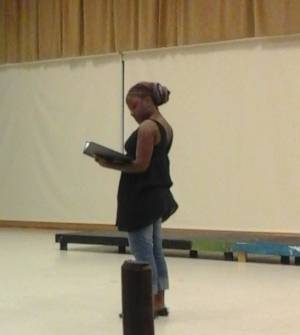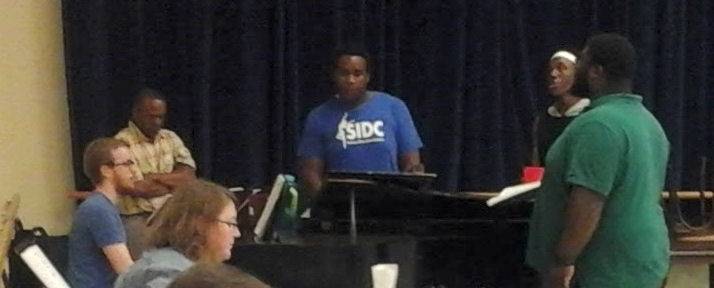 “I think it was a surprise to everyone involved, just how big this project was going to be,” revealed Latrelle Bright during a pre-rehearsal interview. Bright is on the Celebration Company’s board, and has plenty of program coordinator experience behind her, at the University and abroad, but even she looked surprised as she spoke. This production doesn’t have Krannert’s usual theatre department staff at the helm, nor a cast of students dedicated to the craft. This project instead – as part of a Doris Duke Charitable Foundation Grant – was intended to mostly involve non-professional community members.
“I think it was a surprise to everyone involved, just how big this project was going to be,” revealed Latrelle Bright during a pre-rehearsal interview. Bright is on the Celebration Company’s board, and has plenty of program coordinator experience behind her, at the University and abroad, but even she looked surprised as she spoke. This production doesn’t have Krannert’s usual theatre department staff at the helm, nor a cast of students dedicated to the craft. This project instead – as part of a Doris Duke Charitable Foundation Grant – was intended to mostly involve non-professional community members.
This portion of the grant was specifically intended to help BBL “build organizational capacity and sustainability” (grantspeak) through a community-centered production. To that end, members of SITI Company spent the first quarter of 2015 leading a workshop series on Saturday mornings, led interactive workshops and youth acting workshops, and helped with steering committee meetings and auditions. All of this work led to the presentation of the Dreamgirls Revue last October at KCPA’s Stage 5. Bright remembers, “The lobby was just packed full of people. Fabulous people showed up, Sherrika [Ellison] was one of them, Erica Smith, but in the first round of auditions, they didn’t get enough people, which is why they decided to do a revue.” The intent was always to do a full production, unfortunately, she says, “Doing a full show is a lot more work. We have rehearsals from 6-10 p.m. Monday through Friday, and 1-3 p.m. on Saturday, so it’s a much bigger time commitment.” There’s that word again.
In fact, when we spoke about the time commitment, Ms. Bright took a moment to address that as one of the biggest challenges this production has faced. “In the community theatre world, rehearsals are in the evening, which works if you work 9 to 5. But if you do shift work, if you’re a waiter, if you’re working at FedEx, that’s not going to work for you. When you think demographically, it’s an issue with just being available.” That lack of availability doesn’t just create scheduling problems, however. When you think about it, if someone has been working from a very young age, that doesn’t leave a lot of time for extracurriculars like drama, which leads to a lack of knowledge of theatre basics, which then have to be taught.
I got a chance to see this teaching in action during a rehearsal, while music director Nathaniel Banks and vocal coach Justin Brauer were helping Kevin LeSure, Preston Roseborough, and Adrian Rochelle learn the song “Party, Party.” About two and a half weeks before opening night, Tiny Joe, M.C., and Little Albert (respectively), were already quite impressive. If the supporting actors sound this good, that’s enough to make me certain that the leads might just blow the roof off the Studio Theatre. Take a listen:
[[mp3 kcpa_dreamgirls_party_party]]
I heard them go over and over their parts, individually and together, stopping for minor corrections from their coach. Ms. Bright again reinforced the big effort they were making, telling me, “there’s a lot of teaching, especially about vocal care; this is a really difficult show. You have to be careful with people who aren’t used to singing several hours a day, there’s a lot of training involved.”

She spoke, too, about the wide variances you find in a community production. “You have April Blacker (cast as Michelle Morris, the fourth Dream) who has a résumé detailing how many musicals she’s been in, and you have people who have just never been in any theatre production before. You have a wide age range, from Mr. Hayes who is past retirement age, to our youngest who might be fifteen. The Dreams, aside from Tafadzwa (Effie White), are all in High School.” Even with a pro team of directors and the amazing Endalyn Taylor as choreographer, it takes a lot to coordinate such a spectrum of experience.
That holds especially true with a musical like Dreamgirls, which in itself is quite challenging. I’m sorry if this is nonsense to you, but the lead female role’s range goes from low F below the staff to high C. That is no joke.

The men’s roles are nearly as impressive, some requiring falsetto high enough that the bass clef just doesn’t go there. My eyes popped when I saw the audition announcement, and I wondered to myself if anyone would show up able to fulfill the roles, let alone enough to populate a show this size. Ms. Bright agreed, saying, “Everyone who showed up was fabulous: we just needed more of them. Especially young black men who want to be in a musical. Finding guys for theatre is always challenging; black guys in musicals isn’t really something you see around here a lot.” I’m happy that one of the male leads is a black guy in a musical who has caught my ear before: Cedric Jones has been on my list of locals to watch for the last year, and he’ll be playing James Early. Likewise, Tafadzwa Diener was a bright spot in last year’s Fiddler and held her own against strong talents in Noises Off! so I am certain she shine as Effie.
Dreamgirls has secured just over two dozen cast members, less than half of them men, with only a little doubling of roles. That’s a fairly big cast for any production, especially one that is going to be staged in the Studio Theatre of KCPA. Upon hearing that, apparently I involuntarily made a face that prompted Ms. Bright to laughter. “Why? Why that face?” she asked me, and my only reply was, “Isn’t there a part about a car?” The good thing about the Studio Theatre, however, is that you can get away with there not being a car, and since the budget for this production was limited, there was never going to be a car. Bright is certain that lighting director David Krupla will be able to make everything look fabulous, so she dedicated the largest portion of the budget to costumes and wigs. That seems wise, clothes do tend to make the character, for both the actor and the audience.
The grant that started this entire effort is titled “Making Communities Visible” – meaning within the arena of community performing arts – and as this weekend’s performances are entirely sold out, I’d say the first step has been solidly taken. I highly recommend you get on the waitlist for this weekend, as a way to both support the community and enjoy yourself.









